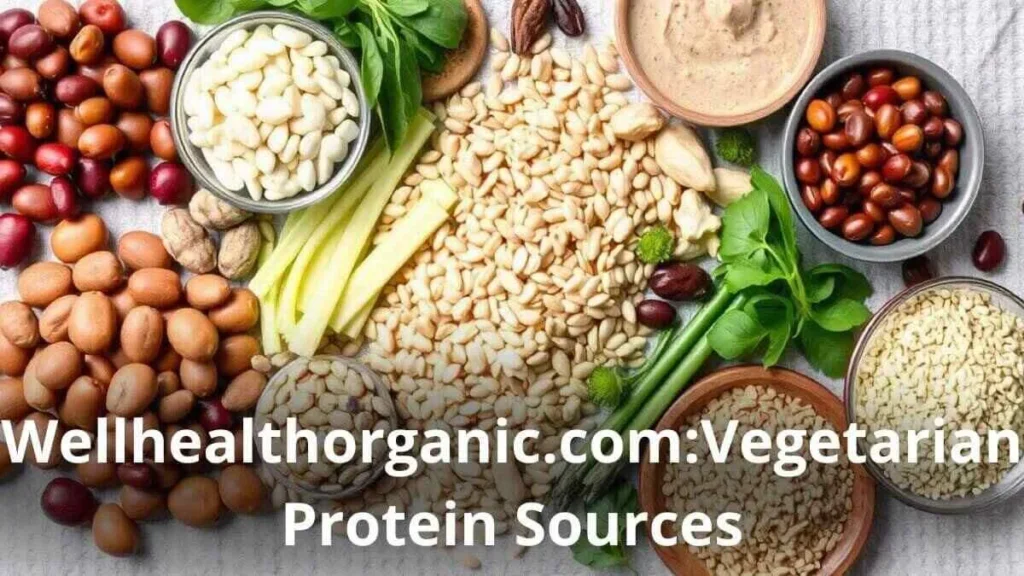When it comes to maintaining a healthy diet, protein is an essential nutrient that supports muscle growth, repair, and overall body function. While many people associate protein with meat and dairy, vegetarians can also meet their protein needs through a variety of plant-based sources. At wellhealthorganic.com:vegetarian protein sources, we are dedicated to helping you discover nutritious and delicious vegetarian options that can boost your protein intake and contribute to a balanced diet.
In this post, we’ll explore some of the best vegetarian protein sources, their benefits, and how to incorporate them into your meals.
Why Protein is Essential
Protein is made up of amino acids, which are the building blocks of muscles, tissues, and enzymes. It plays a crucial role in:
- Muscle Repair and Growth: Protein helps repair and build muscle tissues, making it essential for recovery after exercise.
- Immune Function: Proteins are key components of antibodies and immune system cells, supporting overall immune health.
- Hormone Production: Many hormones, including insulin and thyroid hormones, are proteins that regulate various bodily functions.
- Satiety and Weight Management: Protein helps keep you feeling full and satisfied, which can aid in weight management and prevent overeating.
Top Vegetarian Protein Sources
1. Lentils
Lentils are a powerhouse of protein and are incredibly versatile. A cup of cooked lentils provides about 18 grams of protein. They are also rich in fiber, iron, and essential vitamins. Lentils can be used in soups, stews, salads, and even as a meat substitute in dishes like lentil burgers.
2. Chickpeas
Chickpeas, or garbanzo beans, are another excellent source of protein, offering about 15 grams per cup when cooked. They are also high in fiber and beneficial nutrients like folate and manganese. Chickpeas can be used in a variety of dishes, including hummus, salads, and curries.
3. Quinoa
Quinoa is a complete protein, meaning it contains all nine essential amino acids that our bodies cannot produce on their own. A cup of cooked quinoa provides about 8 grams of protein. It is also high in fiber, magnesium, and iron, making it a nutritious addition to salads, bowls, and as a side dish.
4. Tofu
Tofu, made from soybeans, is a versatile protein source with about 10 grams of protein per half-cup serving. It’s also a good source of iron and calcium. Tofu can be stir-fried, grilled, added to soups, or used as a base for various dishes. Its ability to absorb flavors makes it a popular choice in many vegetarian recipes.
5. Tempeh
Tempeh is a fermented soybean product that provides around 15 grams of protein per half-cup serving. It is also rich in probiotics, which support gut health. Tempeh has a nutty flavor and firm texture, making it a great addition to stir-fries, sandwiches, and salads.
6. Edamame
Edamame are young soybeans and are packed with protein, offering about 17 grams per cup when cooked. They are also rich in fiber, vitamins, and minerals. Edamame can be enjoyed as a snack, added to salads, or used in various Asian dishes.
7. Greek Yogurt
Greek yogurt is an excellent source of protein for vegetarians who consume dairy. A serving of Greek yogurt provides about 10-15 grams of protein, depending on the brand. It is also rich in calcium and probiotics. Enjoy Greek yogurt with fruit, nuts, or as a base for smoothies and desserts.
8. Cottage Cheese
Cottage cheese is another dairy product high in protein, with about 11-12 grams per half-cup serving. It is also a good source of calcium and other essential nutrients. Cottage cheese can be eaten on its own, mixed with fruit, or added to salads and dishes for extra protein.
9. Hemp Seeds
Hemp seeds are a complete protein source, providing about 10 grams of protein per 3 tablespoons. They are also rich in healthy fats, including omega-3 and omega-6 fatty acids. Hemp seeds can be sprinkled on salads, blended into smoothies, or added to yogurt and oatmeal.
10. Chia Seeds
Chia seeds are tiny but packed with protein, offering about 4 grams per 2 tablespoons. They are also high in omega-3 fatty acids, fiber, and antioxidants. Chia seeds can be added to smoothies, yogurt, or used to make chia pudding.
Incorporating Vegetarian Protein Sources into Your Diet
Here are some easy and delicious ways to include these protein-rich foods in your daily meals:
- Breakfast: Start your day with a smoothie made from Greek yogurt, chia seeds, and fresh fruit. Alternatively, try a quinoa breakfast bowl with nuts and berries.
- Lunch: Prepare a hearty lentil or chickpea salad with mixed vegetables and a light vinaigrette. You can also add tofu or tempeh to your favorite grain bowl.
- Snacks: Enjoy edamame or a handful of hemp seeds as a healthy snack. Greek yogurt with a sprinkle of chia seeds also makes a great midday treat.
- Dinner: Incorporate tempeh or tofu into stir-fries or curries. Serve with a side of quinoa or brown rice for a well-rounded meal.
- Desserts: Try chia pudding made with almond milk and topped with fresh fruit or a dollop of Greek yogurt.
Conclusion: Embrace a Protein-Rich Vegetarian Diet
At wellhealthorganic.com:vegetarian protein sources, we believe in the power of plant-based nutrition to support a healthy and balanced diet. By incorporating these top vegetarian protein sources into your meals, you can ensure that you’re meeting your protein needs while enjoying a variety of delicious and nutritious foods.
Whether you’re a committed vegetarian or simply looking to add more plant-based options to your diet, these protein sources offer a wealth of benefits and versatility. Explore new recipes and enjoy the many health benefits that come with a protein-rich vegetarian diet!
Also read: Wellhealthorganic.com: Jaggery with Incredible Health Benefits
